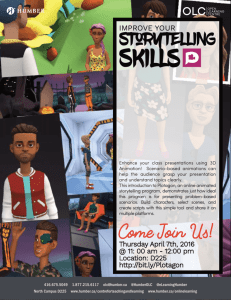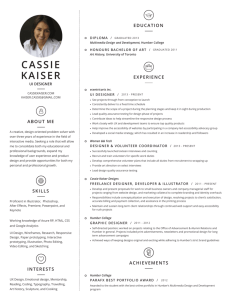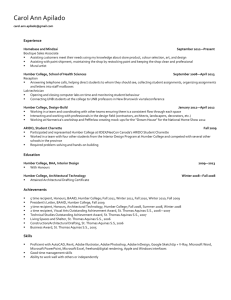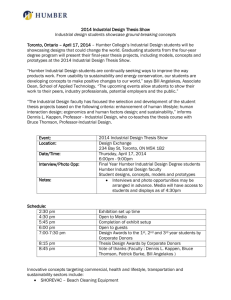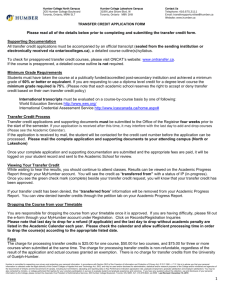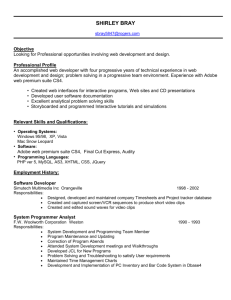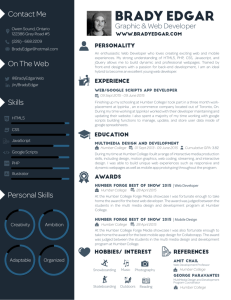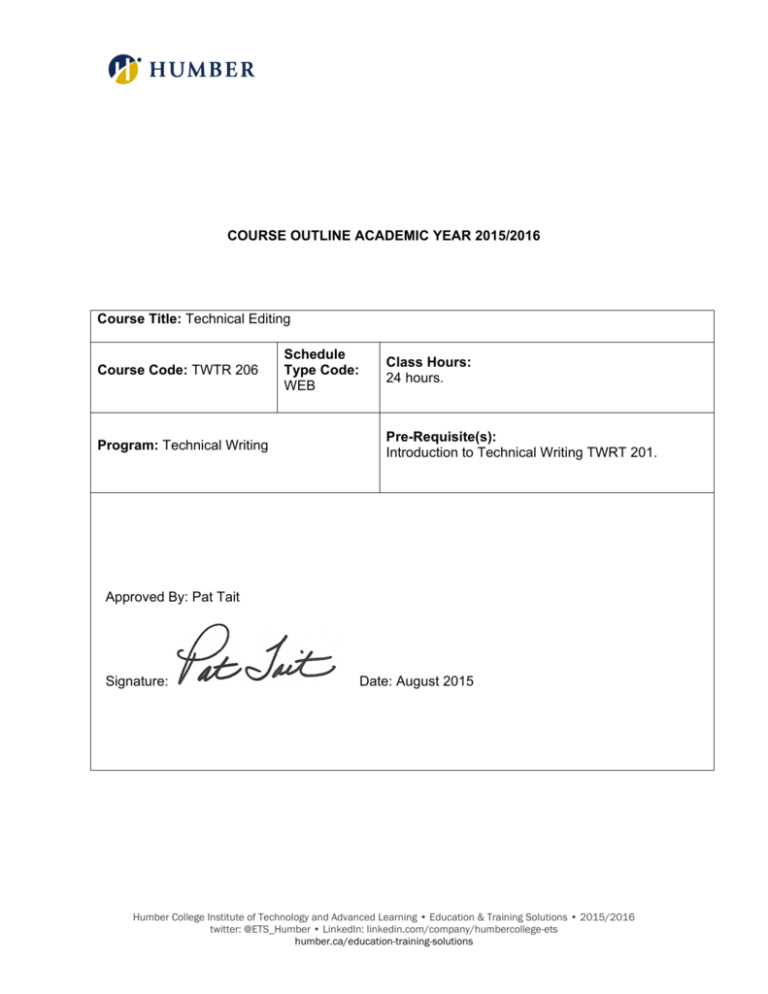
COURSE OUTLINE ACADEMIC YEAR 2015/2016
Course Title: Technical Editing
Course Code: TWTR 206
Program: Technical Writing
Schedule
Type Code:
WEB
Class Hours:
24 hours.
Pre-Requisite(s):
Introduction to Technical Writing TWRT 201.
Approved By: Pat Tait
Signature:
Date: August 2015
Humber College Institute of Technology and Advanced Learning • Education & Training Solutions • 2015/2016
twitter: @ETS_Humber • LinkedIn: linkedin.com/company/humbercollege-ets
humber.ca/education-training-solutions Course Description
This course provides students with hands-on experience in technical editing for print and online
documents. Students will be introduced to the three levels of edits: proofreading, copyediting,
and comprehensive editing. They will practice the techniques and strategies that editors use for
each of these editing levels. Most importantly, they will understand the vital role of technical
editing within the product documentation lifecycle.
Learning Outcomes
Upon successful completion of this course, students will be able to:
1. Recognize basic parts of speech and basic sentence patterns.
2. Analyze various sentence forms and functions.
3. Recognize and correct major errors in sentence structure.
4. Maintain time sense by using consistent verb tenses.
5. Use plain English
6. Use precise vocabulary
7. Know the difference between copyediting and comprehensive editing
8. Edit a document by copyediting or comprehensive editing methods
9. Edit for conciseness
10. Use friendly conversational style
11. Use balance and parallelism
12. Use word order for clarity and/or emphasis
13. Keep the focus on the reader
14. Edit online documents
15. Develop productive relationships with subject matter experts and writers.
Essential Employability Skills
Essential Employability Skills are transferable skills that provide the foundation for a student’s
academic, vocational, and personal success.
Writing
Upon completion of this
course, the student will be
able to produce clear,
concise, correct and
coherent written texts to suit
the intended audience and
purpose.
Organize the message
according to purpose
Select only that content
necessary to convey the
message
Employ style, tone, and
vocabulary appropriate
to the message,
situation,
Listening
Upon completion of this
course, the student will
be able to interpret and
restate accurately or
summarize spoken
messages.
Follow directions
Ask appropriate
questions to clarify
meaning
Control internal and
external elements
that may cause
interference
Resource
Management
Upon completion of this
course, the student will
be able to identify and
use resources
effectively for personal
and work-related goals.
Work within time
frames and meet
deadlines
Demonstrate an
ability to use various
learning strategies
to accomplish
an educational goal
Humber College Institute of Technology and Advanced Learning • Education & Training Solutions • 2015/2016
twitter: @ETS_Humber • LinkedIn: linkedin.com/company/humbercollege-ets
humber.ca/education-training-solutions
and intended audience
Apply the conventions
of grammar, spelling,
and punctuation
Utilize expertise
appropriately
Learning Resources
Technical Editing
Carolyn Rude, Fifth Edition
Publisher: Allyn & Bacon/Pearson Longman Publishers
ISBN: 0-205-78671-5
This textbook can be ordered in person or online from the Humber College bookstore or through
online vendors like amazon.
Learning Delivery Format: Online
Course Content
UNIT TOPIC(S)
ASSESSMENTS
1.
Welcome
Welcome to the course
Student homepage
2.
Considerations in
technical editing
The editor–writer
relationship
Define what technical editing is and the
considerations that exist for technical editors
Describe how users approach and read documents
Describe the editor’s role on the team
Demonstrate the difference an editor can make on
a documentation project
Describe the editor–writer relationship
Present common issues in working with writers
Copymarking
symbols
Procedural
markup versus
structural markup
Online editing
Use copymarking symbols correctly
Understand the difference between a procedural markup
and a structural markup
Outline how to approach different types of editing
(hardcopy and online)
Do online editing in Word
3.
Humber College Institute of Technology and Advanced Learning • Education & Training Solutions • 2015/2016
twitter: @ETS_Humber • LinkedIn: linkedin.com/company/humbercollege-ets
humber.ca/education-training-solutions 4.
Proof reading
Common
document
problems
Identify spelling and punctuation errors
Distinguish between proof reading and copy editing
Understand proof reading marks and how to use them
5.
Copy Editing
Define copyediting
Determine major grammatical errors in documents
Correct common problem areas in documents (such
as spelling, consistency, and accuracy) related to
editing
6.
Stylistic Editing
Identify how arrangement, phrasing, and voice is used
Edit a procedure using "technical" style
7.
Comprehensive
editing
Strategies
Common
document
problems
Define comprehensive editing
Describe comprehensive editing methodology
and strategies
Chunk and organize a procedure for reader
Recognition\
Analyze manual structures for flow, order, and pattern
issues that determine structural strengths and weakness.
Graphics Editing
8.
Effectively organize a technical document.
Design visually for your audience.
Edit online documents. Please note: this course schedule may change as resources and circumstances require.
Student Evaluations
Assignments
Exercises
Chat and Discussions
56%
28%
16%
Total Marks = 100%
Minimum grade of 60% is required to pass the course.
Copyright
Copyright is the exclusive legal right given to a creator to reproduce, publish, sell or distribute
his/her work. All members of the Humber community are required to comply with Canadian
copyright law which governs the reproduction, use and distribution of copyrighted materials.
This means that the copying, use and distribution of copyright- protected materials, regardless
of format, is subject to certain limits and restrictions. For example, photocopying or scanning an
entire textbook is not allowed, nor is distributing a scanned book.
See the Humber Libraries website (http://library.humber.ca) for additional information regarding
copyright and for details on allowable limits.
Humber College Institute of Technology and Advanced Learning • Education & Training Solutions • 2015/2016
twitter: @ETS_Humber • LinkedIn: linkedin.com/company/humbercollege-ets
humber.ca/education-training-solutions Tests and Assignments
Assignments must be submitted on or before the "due date", as directed by the instructor. Late
submissions, without valid reasons (such as illness or emergency) or without prior arrangement
may be penalized by the instructor, normally at 10% per day, or as announced by the instructor.
Days of lateness will include weekends and holidays. If for valid reasons, an
assignment/evaluation cannot be completed on time, then a reasonable penalty-free time
extension may be given by the instructor. Claims of illness or other emergencies may have to be
documented, if required by the instructor or the administration.
Advanced notice by email is required if you are going to miss a test and supporting
documentation must be submitted. If you miss a test without prior notice due to illness or some
emergency, you must provide the reason in writing to the instructor within 3 days of the missed
test. If your reason is accepted by the instructor and the college, arrangements will be made for
you to write the test.
Grade Report, Transcript, and Certificate
Upon completion of a course, student access to grades can be obtained online by logging onto
the Myhumber website at www.humber.ca/myhumber using the Humber issued username and
password. For assistance logging in or for a password reset, visit www.its.humber.ca.
Policies and Procedures
It is the student’s responsibility to be aware of the College Academic Regulations which can be
found on the following website: http://www.humber.ca/academic-regulations
Academic Integrity
Academic integrity is essentially honesty in all academic endeavors. Academic integrity requires
that students avoid all forms of academic misconduct or dishonesty, including plagiarism,
cheating on tests or exams or any misrepresentation of academic accomplishment.
Academic Concern/Appeals
If a student has questions or concerns regarding a grade on an assignment or test, the student
should discuss the matter with the faculty member. The Program Co-ordinator and/or the
Associate Dean may be asked to assist if the faculty member and student are unable to resolve
issues.
Students may request an individual piece of work or the final course grade to be reviewed within
ten (10) business days of receiving the graded evaluation.
Complete details regarding academic appeals are found in the College’s Admission
Requirements & Academic Regulations at www.humber.ca/academic-regulations
Humber College Institute of Technology and Advanced Learning • Education & Training Solutions • 2015/2016
twitter: @ETS_Humber • LinkedIn: linkedin.com/company/humbercollege-ets
humber.ca/education-training-solutions Disability Services
Humber seeks to create a welcoming environment where equity, diversity and safety of all
groups are fundamental. Humber is dedicated to providing equal access to students with
disabilities. The Disability Services staff are available by appointment to assess specific needs,
provide referrals and arrange appropriate accommodations. If you require academic
accommodations, contact:
Disability Services: http://www.humber.ca/disabilityservices/
North Campus: (416) 675-6622 X5180
Lakeshore Campus: (416) 675-6622 X3265
Disclaimer
While every effort is made by the professor/faculty to cover all material listed in the outline, the
order, content, and/or evaluation may change in the event of special circumstances (e.g. time
constraints due to inclement weather, sickness, college closure, technology/equipment problems
or changes, etc.). In any such case, students will be given appropriate notification in writing, with
approval from the Dean (or designate) of the School.
Humber College Institute of Technology and Advanced Learning • Education & Training Solutions • 2015/2016
twitter: @ETS_Humber • LinkedIn: linkedin.com/company/humbercollege-ets
humber.ca/education-training-solutions


